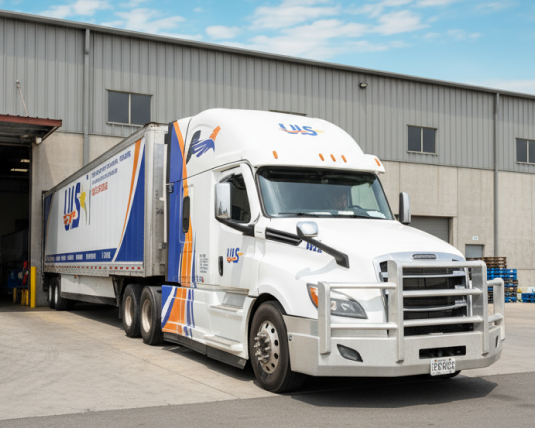Winnipeg to Chicago Reefer Transport: Food and Beverage Cold Chain at Scale
- ULS Freight

Winnipeg sits at the heart of Canada’s Prairies, often called the “Gateway to the Midwest.” It links agricultural producers across Manitoba and Saskatchewan with Chicago’s massive food and beverage distribution network. This trade route forms one of North America’s busiest corridors for perishable goods.
Reefer transport, short for refrigerated trucking, supports this vital supply chain. It ensures consistent delivery of meat, dairy, produce, and frozen foods between Canada and the United States. Reliable cross-border refrigerated freight keeps grocery shelves stocked and restaurants supplied year-round.
Over 70 percent of Canada’s agri-food exports to the U.S. move through the Manitoba–Illinois corridor. This shows how essential cold chain logistics are in maintaining food quality and trade flow across the border.
What Is Reefer Transport and Why It Matters
Reefer transport means using temperature-controlled trucks to move perishable goods safely. These vehicles maintain specific cooling levels to preserve freshness during long hauls. Most trailers operate between zero and five degrees for fresh products or minus eighteen for frozen cargo.
Some units have multiple temperature compartments to handle mixed loads like meat, dairy, and frozen foods. This flexibility allows one vehicle to serve different sectors.
Industries using reefer trucking include food, beverage, agriculture, and pharmaceuticals. A typical Winnipeg to Chicago route maintains temperatures within two degrees for over 1,400 kilometers. Such precision ensures every shipment meets safety and quality standards.
The Winnipeg–Chicago Cold Chain Trade Route
The Winnipeg to Chicago freight lane connects two key food production regions. This direct route follows the I-29 and I-94 corridors, providing fast and efficient access to major U.S. markets.
Transit time for most refrigerated loads ranges from twenty-four to thirty-six hours. This ensures products reach Chicago’s food terminals, distributors, and processing hubs quickly.
Manitoba’s meatpackers, grain processors, and beverage producers benefit from the route’s reliability. Southbound trucks often carry meat and dairy, while northbound loads include U.S. produce and beverages. This two-way traffic supports balanced trade and consistent truck availability year-round.
Challenges in Cross-Border Cold Chain Logistics
Cross-border food transport brings unique challenges. Customs procedures, inspections, and temperature compliance all affect product quality. Both the USDA and CFIA have strict rules for handling perishable freight.
Any delay at the border can cause temperature fluctuations that risk product integrity. That is why logistics providers prepare detailed customs paperwork and maintain constant reefer monitoring during transit.
Driver scheduling also matters. Hours of Service regulations limit driving time, which can affect delivery speed. As one logistics expert explains, even a one-hour delay can impact freshness. Continuous monitoring and preparation prevent these risks.
Technology Driving Modern Reefer Logistics
Technology now plays a central role in maintaining cold chain integrity. Reefer trucks use IoT sensors to track temperature and humidity in real time. These systems send data every few minutes, allowing immediate action if readings change.
AI-based routing tools select the shortest and safest paths for time-sensitive shipments. Automated logs store all temperature data for inspection and compliance with CFIA and FDA standards.
Geofencing alerts notify teams when trucks approach border crossings or key checkpoints. This transparency gives shippers full control over every shipment and reduces compliance risks.
Industries Served by Winnipeg–Chicago Reefer Freight
Several industries depend on this trade route to move goods safely across the border.
Meat and Poultry: Manitoba and Saskatchewan producers export beef, pork, and poultry to Chicago’s distributors and retailers.
- Dairy: Temperature-controlled transport keeps milk, cheese, and yogurt fresh during transit.
- Beverages: Cold chain freight supports energy drink, craft beer, and bottled water distribution.
- Produce: Seasonal imports and exports flow both ways depending on regional harvests.
For example, a Manitoba dairy brand can reach Illinois grocery shelves in under thirty-six hours using continuous refrigeration.
Maintaining Temperature Integrity and Food Safety
Maintaining temperature consistency is crucial for every reefer shipment. Carriers start by pre-cooling trailers before loading, ensuring the cargo enters an already chilled space.
Thermal mapping and validation confirm that cooling air reaches all parts of the trailer. Proper load spacing allows airflow between pallets, keeping products evenly chilled.
Regular reefer maintenance prevents system failures during long trips. Carriers operating under HACCP, ISO 22000, and CFIA standards deliver documented safety assurance for every load.
Cross-Border Compliance and Documentation
Reefer transport across the Canada–U.S. border requires precise paperwork. Shippers must prepare a commercial invoice, bill of lading, and temperature logs for each trip.
For exports, NAFTA or USMCA certificates confirm trade eligibility, while CFIA and USDA clearances ensure food safety. These steps prevent costly inspection delays.
Professional logistics companies handle all documentation, helping clients maintain compliance and reduce administrative stress. They also manage bonded reefer shipments when goods move through multiple border points.
Choosing the Right Reefer Transport Partner
Selecting the right partner ensures your products stay safe and compliant from origin to destination. Choose a carrier with a modern reefer fleet, proven experience in cross-border logistics, and strong monitoring systems.
Reliable providers offer 24/7 tracking, dedicated customer support, and strict food safety procedures. Their teams understand customs regulations and deliver consistent temperature performance under all conditions.
Work with a trusted Winnipeg reefer freight company to secure dependable refrigerated transport to Chicago and beyond.
Move your food and beverage products safely with our Winnipeg–Chicago reefer transport services. We handle everything from temperature control to customs documentation.
Partner with a cross-border cold chain expert that ensures your goods reach their destination fresh and compliant. Request your reefer freight quote today.
FAQs
Transit usually takes twenty-four to thirty-six hours, depending on customs and weather conditions.
Fresh food travels between zero and five degrees, while frozen items remain near minus eighteen.
Proper paperwork and pre-clearance help reduce inspection delays and protect temperature consistency.
Yes. Most modern reefers use GPS and IoT sensors to provide real-time temperature and location updates.
About ULS Freight
We are Road freight forwarder based in Canada, and offering our road freight services all across the USA, Canada, and Mexico for the last 10 years.
Recent Posts

The Global Supply Chain Crisis: How Logistics Companies Are Responding

Cross-Border Freight Challenges: Navigating Compliance in a Global Market

